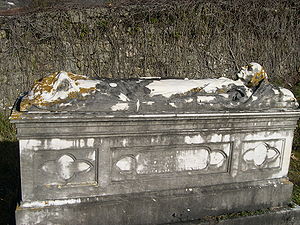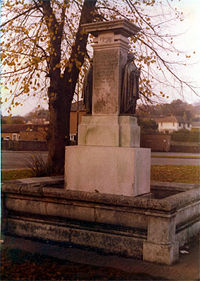- Ouida
-
Maria Louise Ramé 
Born 1 January 1839
Bury St. Edmunds, EnglandDied 25 January 1908 (aged 69)
Viareggio, ItalyPen name Ouida Occupation Novelist Nationality French-English Period 1863–1908 Signature 
Ouida (1 January 1839[1] – 25 January 1908) was the pseudonym of the English novelist Maria Louise Ramé (although she preferred to be known as Marie Louise de la Ramée).
Contents
Biography
Ramé was born in Bury St. Edmunds, England, to a Guernsey-born French-speaking father and an English mother.[2][3] She derived her pen name from her own childish pronunciation of her given name "Louise".[4] Her opinion of her birthplace fluctuated; in one of her books she states
“ That clean, quiet antiquated town, that always puts me in the mind of an old maid dressed for a party; that lowest and dreariest of Boroughs, where the streets are as full of grass as an acre of pasture land. Why, the inhabitants are driven to ringing their own doorbells lest they rust from lack of use. ” During her career, she wrote more than 40 novels, children's books and collections of short stories and essays. She was an animal lover and rescuer, and at times owned as many as thirty dogs. For many years she lived in London, but about 1874 she moved to Italy, where she remained until her death in 1908.
Ouida's work had several successive phases during her career. Her first novel, Held in Bondage was published in 1863, when she was 24.[4] In her early period, her novels were considered "racy" and "swashbuckling", a contrast to "the moralistic prose of early Victorian literature" (Tom Steele)[4] comprising a hybrid of the sensationalism of the 1860s and the proto-adventure novels that were being published in part as a romanticisation of imperial expansion. Later her work was more typically historical romance, though she never stopped comment on contemporary society. She also wrote several stories for children.
One of her most famous novels, Under Two Flags, described the British in Algeria and expressed sympathy for the French—with whom Ouida deeply identified—and, to some extent, the Arabs. This book was adapted in plays (it was also adapted and produced four times as a film). As another sign of influence, the American author Jack London cited her novel Signa, which he read at age eight, as one of the eight reasons for his literary success.[5]
Of short stature "sinister, clever face" and with a "voice like a carving knife" (William Allingham's diary 1872), she moved into the Langham Hotel, London in 1867, where she wrote in bed, by candlelight, with the curtains drawn and surrounded by purple flowers.[6] She ran up huge hotel and florists bills, and commanded soirees that included soldiers, politicians, literary lights (including Oscar Wilde, Algernon Swinburne, Robert Browning and Wilkie Collins), and artists (including John Millais).[4] Many of her stories and characters were based upon people she invited to these salons at The Langham.[6]
Convinced of her ability to influence foreign policy through a combination of womanly wiles and strategic brilliance, she made suggestions to some of her famous visitors that they seemed—at least to her face—to take seriously. The heroine of another well-known novel, Idalia (which she claimed to have written at 16), was a rebel/ingenue sympathetic to Italian independence. Later, while living in France and Italy, Ouida continued to host locals and expatriates alike at her gatherings.
Ouida considered herself a serious artist. She was inspired by Byron in particular, and was interested in other artists of all kinds. Sympathetic descriptions of tragic painters and singers occurred in her later novels. Her work often combines romanticism with social criticism, however. In one novel, Puck, a talking dog narrates his views on society. Views and Opinions includes essays on a variety of social topics written in her own voice.
Although successful, she did not manage her money well and was poor when she died of pneumonia[4] on 25 January 1908, in Viareggio, Italy. She is buried in the English Cemetery in Bagni di Lucca, Italy.
Soon after her death, a public subscription purchased and built a fountain for horses and dogs in Bury St Edmunds,[7] with an inscription composed by Lord Curzon:
“ Her friends have erected this fountain in the place of her birth. Here may God's creatures whom she loved assuage her tender soul as they drink. ”
The composer Pietro Mascagni bought the rights for her story, "Two Little Wooden Shoes", intending to adapt it for an opera. His friend Giacomo Puccini became interested in the story and began a court action, claiming that because Ouida was in debt, the rights to her works should be put up for public auction to raise funds for creditors. He won the court challenge and persuaded his publisher Ricordi to bid for the story. After Ricordi won, Puccini lost interest and never composed the opera. Mascagni later composed one based on the story, under the title Lodoletta.Bibliography
- Two Little Wooden Shoes (1874), also published with the title Bébée
- Afternoon (1883)
- An Altruist (1897)
- Ariadne (1877) pdf
- Beatrice Boville and Other Stories (1868)
- Bimbi: Stories for Children (1882) etext
- Cecil Castlemaine's Gage (1867)
- A Dog of Flanders (1872), English-language film versions in 1935, 1959 and 1999 (starring Jon Voight), popular cartoon TV series in Japan in 1975; etext
- Chandos (1866)
- Critical Studies (1900)
- Dogs (1897)
- Don Guesaldo (1886)
- Frescoes: Dramatic Sketches (1883)
- Friendship (1878)
- Folle-Farine (1871)
- Guilderoy (1889)
- Helianthus (1908)
- Held in Bondage (1863), first published with the title Granville de Vigne
- A House Party (1887)
- The Silver Christ and A Lemon Tree (1894)
- Idalia (1867)
- In a Winter City (1876)
- In Maremma (1882)[2]
- La Strega and Other Stories (1899)
- Le Selve and Other Tales (1896)
- The Massarenes (1897)
- Moths (1880)
- Muriella; or, Le Selve (1897)
- The New Priesthood: A Protest Against Vivisection (1893)
- Othmar (1885)
- Pascarel (1874)
- Pipistrello and Other Stories (1880)
- Princess Napraxine (1884)
- Puck (1870)
- A Rainy June (1885)
- Ruffino and Other Stories (1890)
- Santa Barbara and Other Stories (1891)
- Signa (1875)
- The Silver Christ (1894)
- Strathmore (1865)
- Street Dust and Other Stories (1901)
- Syrlin (1890)
- The Tower of Taddeo (1892)
- Toxin (1895)
- Tricotrin (1869)
- Two Offenders and Other Tales (1894)
- Under Two Flags (1867), film versions 1912, 1916, 1922 (starring Rudolph Valentino), and 1936 (starring Ronald Colman and Claudette Colbert); etext
- Views and Opinions (1895)
- A Village Commune (1881)
- Wanda (1883)
- The Waters of Edera (1900) etext
References
- ^ Encyclopedia, Britannica. "Ouida.". http://www.britannica.com/eb/article-9057719/Ouida. Retrieved 15 January 2008.
- ^ See [1] for a record of the birth certificate
- ^ According to an article published on 29 January 1908 in The New York Times, Ouida was identified as the sister of Civil War officer Col. George Roy Gliddoth and was said to have "left her home in America at a tender age under the care of a woman who adopted her as her daughter." This article can be accessed at The New York Times. Another article about her supposed Gliddoth birth was reported in Publishers Weekly at the same time.
- ^ a b c d e "Cosmopolis History of The Langham". http://www.cosmopolis.ch/travel/the_langham_london.htm. Retrieved 20 October 2010.
- ^ London, Jack (1917) "Eight Factors of Literary Success", in Earle Labor, (ed.) (1994) Viking Penguin. The Portable Jack London, p. 512. "In answer to your question as to the greatest factors of my literary success, I will state that I consider them to be: Vast good luck. Good health; good brain; good mental and muscular correlation. Poverty. Reading Ouida's Signa at eight years of age. The influence of Herbert Spencer's Philosophy of Style. Because I got started twenty years before the fellows who are trying to start today."
- ^ a b "Ouida". Guide to The Langham Hotel. langhamhotels.com. http://ouida.langhamhotels.com/static/ouida_home.aspx. Retrieved 20 October 2010.
- ^ St Edmundsbury, Borough Council. "Ouida Memorial, Bury St Edmunds.". http://www.stedmundsbury.gov.uk/sebc/visit/Ouida-Memorial.cfm. Retrieved 15 January 2008.
External links
- Works by Ouida at Project Gutenberg
- Works by Ouida at Internet Archive
- Works by Ouida at The Victorian Women Writers Project
- Archival material relating to Ouida listed at the UK National Register of Archives
- Book description of In Maremma (1882) at Valancourt Books
- 1905 Magazine Article with Photos
- Ouida Similes
- Works by or about Ouida in libraries (WorldCat catalog)
Categories:- 1839 births
- 1908 deaths
- People from Bury St Edmunds
- English activists
- British novelists
- English novelists
- English women writers
- Women of the Victorian era
- Animal rights advocates
- Female authors who wrote under male or gender-neutral pseudonyms
Wikimedia Foundation. 2010.



